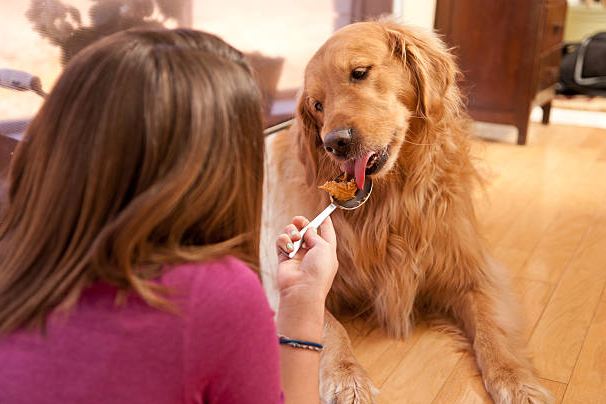Your dog needs a balanced diet of protein, carbohydrates, and fats to maintain good general health, healthy skin and coat, and plenty of energy.
Broad guidelines are: 20-25% protein, 20-35% fat and 40-60% carbohydrate. Like humans, they need vitamins and minerals, though unlike us their need for vitamin C is satisfied by their ability to synthesize it for themselves.
Essential vitamin B1, however, is not stored by dogs and can be lost in food processing. It may need to be supplied as a supplement.
Just feeding your dog lean meat does not satisfy these guidelines. In nature, dogs will eat all of their prey, including fat and the contents of the gut, which as a whole provides close to this ideal balanced diet.
In fact, dogs in the wild have been observed to prefer to eat the gut of their prey first. Studies have confirmed this preference in domestic dogs, by showing they generally prefer their food cooked, warm, wet, and ground-up rather than in raw meaty chunks.
Dogs are not delicate eaters, however. As natural scavengers, they will eat almost anything when they are hungry, and will naturally gulp down large meals quickly when food is available. Their ancestors never knew when next they might get an opportunity to eat.
Commercially processed and balanced dog food is commonly fed to dogs to help meet their ideal requirements, incorporating the necessary vitamin and mineral supplements.
Often these foods come in dry form for ease of storage, or in cans or sausages, and offer a simple and convenient solution that is popular with a high proportion of dog owners.
The commercial pet food business is today a huge industry. Store-bought commercial dog foods are not always cheap, however.
An alternative for dog owners is to mix their own balanced dog food diet. It’s tricky to get the right combination of the right foods.
Human diet guidelines are not necessarily appropriate. You will have to read up on the subject to know what you are doing.
To give one example of the unique dietary issues to consider, including too much dried skim milk powder could cause scouring because of its high lactose content that dogs find difficult to digest. Recipes that offer guidance are readily available should you choose to take this approach.
Dogs like to chew on large bones, but small bones and cooked bones that may splinter should be avoided.
They are a common cause of death for dogs when ingested. Cooked chicken, lamb chop, and fish bones are especially dangerous.
Scraps from the table are always popular with dogs, and feeding your dog after you have eaten is one of the strategies you should adopt to assert your “alpha” position in the “pack“.
But do watch out not just for small bones, but also for other dangers food scraps may contain, like toothpicks.
An aspect of dog behavior is that they will learn to associate a particular food with a bad experience, such as a digestive upset, and, as a natural survival instinct, may never eat it again.
This may explain the frustrating and mysterious aversions to some foods that dog owners occasionally observe.
Feeding your seemingly ravenous dog is a little more complicated than it appears to be at first glance, but rarely presents any difficulty once you are aware of the unique food requirements of dogs.

